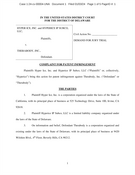-
Proximity Sensors of Texas, LLC v. ZTE Corporation et al DC
- 6:17-cv-00574
- E.D. Tex.
- Judge: Rodney Gilstrap
+1
- Filed: 10/12/2017
- Closed: 03/22/2018
- Latest Docket Entry: 03/22/2018
- PACER
- Docket updated daily
1
Plaintiff
2
Defendants
22
Accused
Products
1
Patent-in-Suit
162
Days in
Litigation
-
Proximity Sensors of Texas, LLC v. ZTE Corporation et al DC
- 6:17-cv-00574
- E.D. Tex.
- Judge: Rodney Gilstrap
+1
- Filed: 10/12/2017
- Closed: 03/22/2018
- Latest Docket Entry: 03/22/2018
- PACER
- Docket updated daily
Cause of Action
Infringement
Market Sector
Mobile Communications and Devices
Referred Judge
Assigned Judge
- Patent Information
